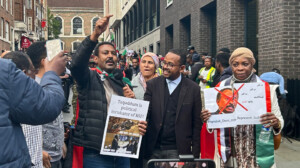Protests unabated across Sudan
Yesterday, student demonstrations continued for the second day all over Sudan condemning and denouncing the killing of four school children and an activist, and wounding dozens of others by militiamen belonging to the Rapid Support Forces(RSF) in the North Kordofan capital of El Obeid on Monday.
 Protest in Ed Daein in East Darfur on Wednesday (RD)
Protest in Ed Daein in East Darfur on Wednesday (RD)
Yesterday, student demonstrations continued for the second day all over Sudan condemning and denouncing the killing of four school children and an activist, and wounding dozens of others by militiamen belonging to the Rapid Support Forces (RSF) in the North Kordofan capital of El Obeid on Monday.
The demonstrations coincided with the announcement of the government to close basic and secondary schools throughout Sudan for an indefinite period of time – possibly until after Eid El Adha (Feast of the Sacrifice), in mid-August.
The five state capitals of Darfur, El Fasher, Nyala, El Geneina, Zalingei, and Ed Daein, as well as Um Kedada in North Darfur, witnessed student demonstrations on the streets of after the students arrived at schools and learned that the schools had been closed by order of the military junta.
El Geneina, capital of West Darfur witnessed, in addition to student demonstrations, a protest march organised by the Sudanese Professionals Association in cooperation with various neighbourhood committees in front of the state Ministry of Education in El Geneina to condemning the “massacre of El Obeid”.
South Darfur
In South Darfur’s Nyala, lecturers of the Faculty of Engineering Sciences held a vigil condemning the massacre of El Obeid.

A student demonstration in Ed Daein, capital of East Darfur, reached the army command in the town. When they returned, police and security forces attacked them with batons. A number of students were detained but released shortly after.
The police in Um Kedada used force and tear gas to disperse the demonstrators. Two students were detained.
In Kutum in North Darfur, leading members of the Forces for Freedom and Change in Kutum were threatened by the military intelligence in the locality not to launch any political activity or demonstration.
A FFC member told Radio Dabanga from Kutum that security officers reappeared in the town after an absence of more than two months. “They are monitoring the movements of the youth and leaders of the FFC, and preventing them from gathering.”
He said that the FFC held an emergency meeting yesterday, in which the members agreed to continue organising political activities despite the threats.
Student demonstrations continued as well in several other Sudanese cities and towns, denouncing the “massacre of El Obeid”.
Khartoum
In Khartoum, demonstrations and protests continued in El Riyadh International College, the International University of Sudan, El Nilein University, and El Fajr College, the Computer Studies College.
In Rabak, El Gezira Aba in White Nile state, El Obeid, Abu Jubeiha, El Mujlad, Banda and Ghibeish in North Kordofan, Wad Madani, Fadasi, Masaudiya in El Gezira, El Damer and Atbara in River Nile state, El Fasha and Shuwak in El Gedaref, Port Sudan in Red Sea state, and Kassala, there were large demonstrations against the killing of school children in El Obeid amid cheers denouncing the military junta, demanding punishment of the perpetrators.

On Thursday, the Sudanese are expected to take to the streets again to participate in the Marches of Millions for Fair Retribution.
The Sudanese Professionals Association (SPA) called on the people “to participate heavily in the marches on Thursday to demand that perpetrators of crimes be brought to justice”.
SPA leader Ismail El Taj confirmed in a news conference in Khartoum the peacefulness of the demonstrations, calling on the security forces to play their role in protecting peaceful protesters.
He defended the right of school students to demonstrate, pointing out their participation in all revolutions that erupted in Sudan and their main role in igniting the December Revolution.
The current uprising began with bread protests that broke out in Atbara in River Nile state in mid-December last year.




Our editorial independence means that we can continue to provide factual updates about political developments to Sudanese and international actors, educate people about how to avoid outbreaks of infectious diseases, and provide a window to the world for those in all corners of Sudan. Support Radio Dabanga for as little as €2.50, the equivalent of a cup of coffee.












 and then
and then